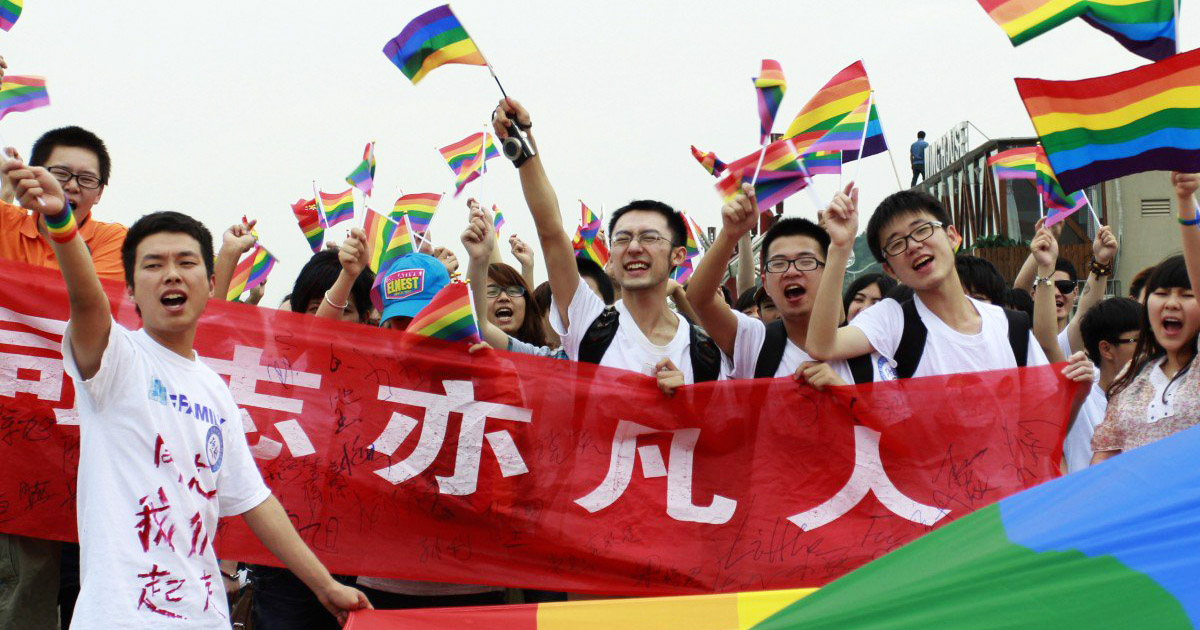The Chinese parliament has been pushed to legalise same-sex marriage ever since Taiwan became the first Asian country to make the embracing leap in May this year. There, the landmark marriage equality bill overcame years of divisive debate and even a landslide referendum defeat against same-sex marriage in November 2018. Still, the ruling Communist Party of China claims Taiwan as its territory, and have announced that they have no intention of enacting marriage equality in the country.
Same-sex relations were decriminalised in China in 1997, though homosexuality remained an official mental disorder until 2001. And although queer scenes thrive in China’s major cities, its LGBT+ people face discriminatory regressive policies that aim to uphold conservative values of the traditional nuclear family. A handful of individual politicians have made attempts to introduce measures inclusive to the LGBT+ community at annual parliament meetings, all largely unsuccessful due to the bureaucratic nature of the ruling party.
When questioned on the matter in a news briefing, spokesperson for the Chinese parliament’s legal affairs commission Zang Tiewei stated that the current legislation “suits our country’s national condition and historical and cultural traditions”. Tiewei ruled out the possibility of the Chinese parliament legalising same-sex marriage in the foreseeable future, justifying his position with: “As far as I know, the vast majority of countries in the world do not recognise the legalisation of same-sex marriage.”
According to the Council on Foreign Relations, legal marriage equality is recognised in 27 countries globally, though the majority of African, Asian and Eastern European countries do not recognise same-sex marriages. If the Chinese government were to legalise same-sex marriages, almost one-third of Asia’s population would be supported by inclusive marriage laws. Unfortunately, this is not the case, and conservative ideals have taken a toll on the mental health of China’s LGBT+ people:
“I feel that my partner and I are sacrificing our happiness for the country’s legal system,” gay rights activist Sun Wenlin told Reuters. Wenlin and his partner appealed for marriage to the Chinese court three years ago, only to have their application rejected.
Discriminatory LGBT+ legislation in China is not exclusive to same-sex couples; transgender people are considered to have a mental illness and must gain the consent of their family to medically transition.
“China is failing transgender people,” said researcher for Amnesty Doriane Lau. “Discriminatory laws and policies have left many people feeling they have no choice but to risk their lives by performing extremely dangerous surgery on themselves and seeking unsafe hormone drugs on the black market.”
© 2019 GCN (Gay Community News). All rights reserved.
Support GCN
GCN is a free, vital resource for Ireland’s LGBTQ+ community since 1988.
GCN is a trading name of National LGBT Federation CLG, a registered charity - Charity Number: 20034580.
GCN relies on the generous support of the community and allies to sustain the crucial work that we do. Producing GCN is costly, and, in an industry which has been hugely impacted by rising costs, we need your support to help sustain and grow this vital resource.
Supporting GCN for as little as €1.99 per month will help us continue our work as Ireland’s free, independent LGBTQ+ media.
